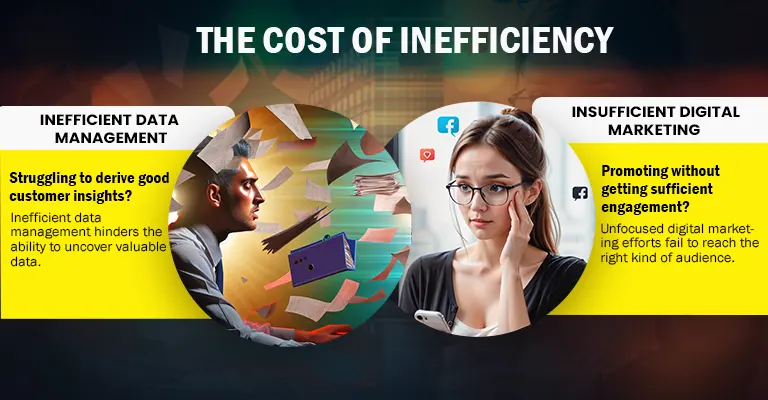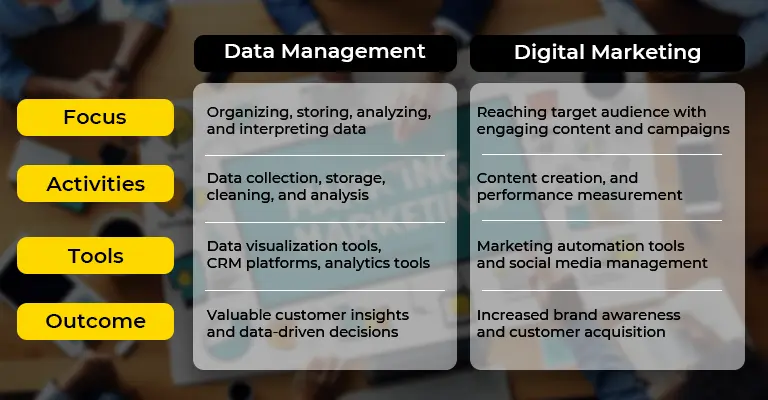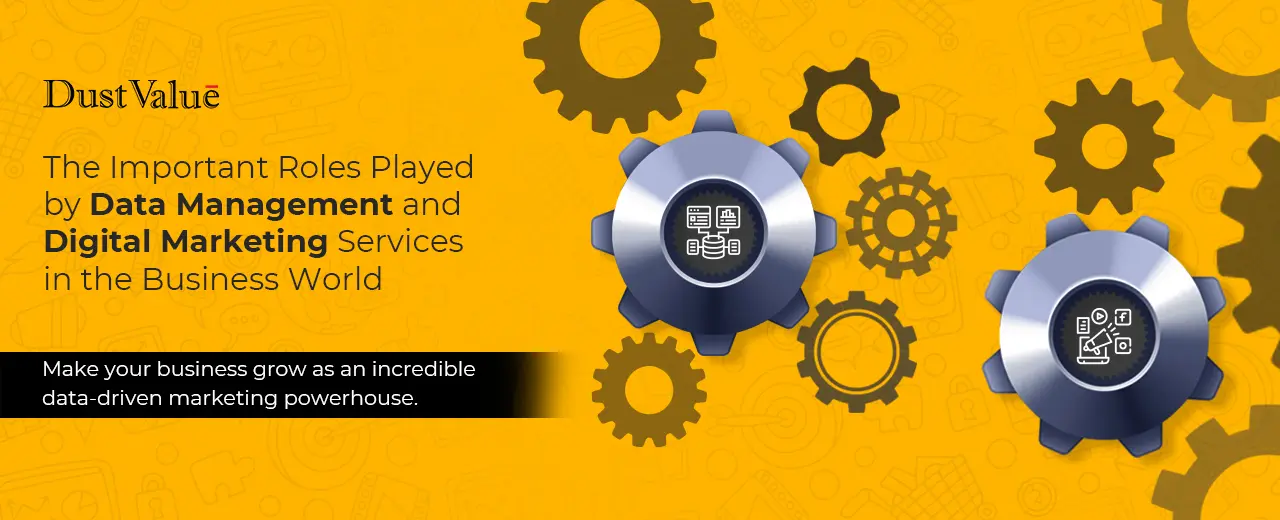A Holistic Overview of Data Management and Digital Marketing for Business Growth
In today's data-driven business landscape, two crucial forces propel growth: data management and digital marketing. While distinct in their approaches, these services work in tandem to unlock valuable customer insights and fuel effective marketing strategies.
However, many businesses face a critical gap – a disconnect between their data and their marketing efforts. This might lead to a business conundrum wherein business may collect vast amounts of data but lack the expertise to interpret it effectively. Conversely, their digital marketing might be well-crafted but not targeted to the right audience due to a lack of data insights.

Let's delve deeper into each service and explore how departments managing both can contribute to overall business success in our latest blog. However, before we dive into details, first we must learn more about these services from a holistic perspective.
Unveiling the Powerhouses: Data Management and Digital Marketing
Data Management:
Data management acts as the guard that protects and safeguards data for your business and provides sufficient business intelligence. It encompasses the entire lifecycle of data, from collection and storage to analysis and interpretation. This ensures you have clean, accurate, and readily accessible data for informed decision-making. This business function usually encompasses:
- Data Collection: Gathering data from diverse sources – website analytics, customer interactions, social media platforms, etc.
- Data Storage: Securely housing this data in organized databases or cloud storage solutions.
- Data Cleaning: Identifying and rectifying errors or inconsistencies within the data.
- Data Analysis: Extracting valuable insights and patterns from the data through various analytical tools.
Digital Marketing:
Digital marketing is the promotion-powered machine of your brand, reaching your target audience across various digital channels. It involves crafting compelling content, strategizing campaigns, and leveraging data to personalize customer experiences. This business function encompasses:
- Campaign Development: Strategizing and designing marketing campaigns across various digital channels (social media, email marketing, search engine optimization (SEO), etc.)
- Content Creation: Developing engaging content – blog posts, infographics, videos – that attracts and educates your audience.
- Audience Targeting: Identifying and reaching out to a well-defined customer base based on demographics, interests, and online behavior.
- Performance Measurement: Tracking and analyzing the effectiveness of marketing campaigns to optimize future efforts.

The Controlling Factors Behind the Scenes
Roles and Responsibilities of a Data Analyst:
Data analysts are the architects of insights. They possess the skills to extract valuable patterns and trends from raw data. Through data visualization and storytelling, they translate complex data sets into actionable insights for business leaders.
- Design and implement data collection strategies
- Clean and organize data for analysis
- Utilize data analysis tools to identify trends and patterns
- Develop reports and visualizations to communicate insights
- Collaborate with other departments to translate data into actionable strategies
Role and Responsibilities of a Digital Marketer:
Digital marketers are the strategists of engagement. They understand customer behaviour and craft targeted campaigns that resonate with their audience. They leverage data to optimize content, measure campaign performance, and drive conversions.
- Develop and manage digital marketing campaigns across various channels
- Create engaging content (blogs, videos, social media posts) tailored to the target audience
- Manage social media presence and engage with followers
- Analyze campaign performance and optimize strategies for better results
- Stay updated on the latest digital marketing trends and technologies
Putting it into Action: A Roadmap to Success
There are several steps to effectively undertake a collaborative approach between data management and digital marketing for your business with the following steps.
- Define Your Goals: Clearly outline your business objectives – brand awareness, lead generation, increased sales, etc.
- Invest in the Right Tools: Utilize customer relationship management (CRM) platforms, data visualization tools, and marketing automation solutions.
- Foster Collaboration: Bridge the gap between data and marketing teams, fostering open communication and collaboration.
- Embrace a Data-Driven Culture: Cultivate an organizational culture that values data-driven decision making based on insights, not guesswork.
Bridging the Gap: Collaboration is Key
While data management and digital marketing operate independently, their collaboration unlocks a wealth of benefits. Regular communication and data exchange can empower teams working in both departments. By correctly implementing the above roadmap, businesses can unlock a treasure trove of business values and benefits. Firstly, they can derive enhanced customer acquisition and Retention by carrying out targeted campaigns and personalized experiences to attract and retain high-value customers. Next in line is the improved ROI on marketing investments received by taking data-driven decisions by ensuring that marketing budgets are spent wisely.
Business can also increase brand loyalty and advocacy through personalized interactions that foster deeper customer connections. Lastly, by making both data management and digital marketing services work in tandem, the data insights derived can shed a better light on customer needs and preferences, thus guiding product development strategies for better market alignment.
In the digital age, data is the new currency that powers today’s marketing processes for a better tomorrow. Thus, it is certainly safe to say that the future of business is data-driven marketing. By leveraging data management and digital marketing as a unified force, businesses unlock unprecedented growth potential. This data-driven approach fosters customer-centricity, optimizes marketing efforts, and empowers businesses to navigate the ever-evolving digital landscape with a clear vision and a powerful strategy.
